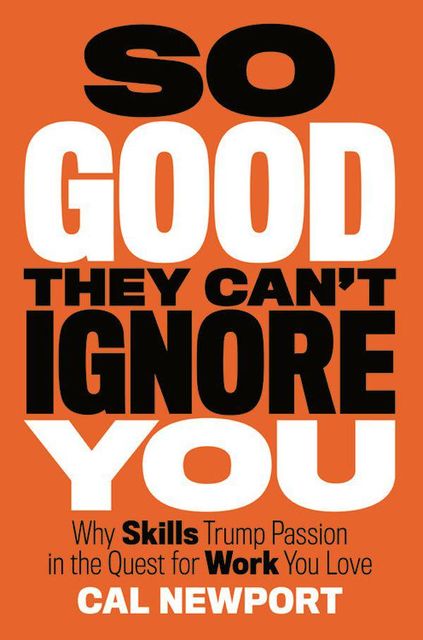So Good They Can't Ignore You: Why Skills Trump Passion in the Quest for Work You Love
- Aliya Sabyrhas quoted8 years ago“The key thing is to force yourself through the work, force the skills to come; that’s the hardest phase
- Valentine Yesicahas quoted7 years agoThis is what you should experience in your own pursuit of “good.” If you’re not uncomfortable, then you’re probably stuck at an “acceptable level.”
- Teotlinhas quoted5 years agoSDT tells us that motivation, in the workplace or elsewhere, requires that you fulfill three basic psychological needs—factors described as the “nutriments” required to feel intrinsically motivated for your work:
Autonomy: the feeling that you have control over your day, and that your actions are important
Competence: the feeling that you are good at what you do
Relatedness: the feeling of connection to other people - b7402846592has quoted5 years agoTHREE DISQUALIFIERS FOR APPLYING THE CRAFTSMAN MINDSET
The job presents few opportunities to distinguish yourself by developing relevant skills that are rare and valuable.
The job focuses on something you think is useless or perhaps even actively bad for the world.
The job forces you to work with people you really dislike. - Dinmukhamed Junussovhas quoted5 years agoThis focus on stretching your ability and receiving immediate feedback provides the core of a more universal principle—one that I increasingly came to believe provides the key to successfully acquiring career capital in almost any field
- Soliloquios Literarioshas quoted6 years agoBut Wrzesniewski wasn’t done. She surveyed the assistants to figure out why they saw their work so differently, and discovered that the strongest predictor of an assistant seeing her work as a calling was the number of years spent on the job. In other words, the more experience an assistant had, the more likely she was to love her work
- Annisia Baehakihas quoted6 years agothis main thread of my argument moves beyond the mere acquisition of useful skills and into the subtle art of investing the career capital this generates into the right types of traits in your working life.
- talgatakkabakov45937has quoted6 years agoYou stretch yourself, day after day, month after month, before finally looking up and realizing, “Hey, I’ve become pretty good, and people are starting to notice.”
- Sanzhar Surshanovhas quoted7 years agoThe core idea of this book is simple: To construct work you love, you must first build career capital by mastering rare and valuable skills, and then cash in this capital for the type of traits that define compelling careers. Mission is one of those traits.
In the first chapter of this rule, I reinforced the idea that this trait, like all desirable career traits, really does require career capital—you can’t skip straight into a great mission without first building mastery in your field. Drawing from the terminology of Steven Johnson, I argued that the best ideas for missions are found in the adjacent possible—the region just beyond the current cutting edge.
To encounter these ideas, therefore, you must first get to that cutting edge, which in turn requires expertise. To try to devise a mission when you’re new to a field and lacking any career capital is a venture bound for failure.
Once you identify a general mission, however, you’re still left with the task of launching specific projects that make it succeed. An effective strategy for accomplishing this task is to try small steps that generate concrete feedback—little bets—and then use this feedback, be it good or bad, to help figure out what to try next. This systematic exploration can help you uncover an exceptional way forward that you might have never otherwise noticed.
The little-bets strategy, I discovered as my research into mission continued, is not the only way to make a mission a success. It also helps to adopt the mindset of a marketer. This led to the strategy that I dubbed the law of remarkability.
This law says that for a project to transform a mission into a success, it should be remarkable in two ways. First, it must literally compel people to remark about it. Second, it must be launched in a venu - Valentine Yesicahas quoted7 years agoWhereas the craftsman mindset focuses on what you can offer the world, the passion mindset focuses instead on what the world can offer you. This mindset is how most people approach their working lives.
fb2epub
Drag & drop your files
(not more than 5 at once)


